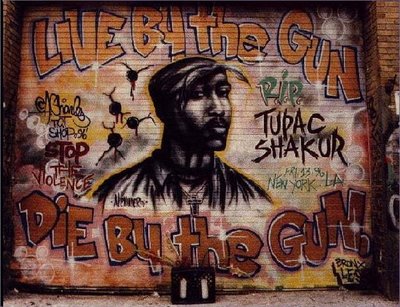
It's been 10 years since the murder of Tupac Amaru Shakur, the West Coast rap legend who was gunned down on the Las Vegas strip Sept. 7, 1996. He died six days later on Sept. 13, a violent end to a brilliantly flawed artist whose star seemed to loom larger in death than it did in life.
In fact, Tupac's death seemed to usher in a scary trend of the posthemous rap artist as marketing tool. While he was certainly a star in his own right while he was alive, his death lionized his legacy. Dead at 25, Tupac became a legend, and a profitable one at that.
Since his death, dozens of albums, most of them unauthorized, have been released under his name. The handful of official releases have routinely debuted in the top 10 album charts, and Tupac has wedged his way into the top 10 all-time profitable dead celebrities list (joining the likes of Elvis, Frank Sinatra, Marilyn Monroe and Bob Marley). In his death, Tupac became the first official hip-hop icon, a brand name whose image along with his art has achieved broad mainstream public appeal.
At the same time, Tupac's death brought out possibly one of the worst practices in hip-hop marketing: the posthumous album. Albums released by dead rappers have become a cottage industry within itself, beginning with 2Pac's "Makaveli - Don Killumaniti: The 7 Day Theory," and then followed closely by The Notorious BIG, who was gunned down in March 1997, six months after Tupac's death.
Since those dark days in hip-hop, posthumous albums, street records, mixtapes and even collaborations amongst dead rappers post mortem, have been released. Big L, Big Pun, Mac Dre, Eazy-E and Souljah Slim have all had successful record releases in the afterlife.
In the song "We Gon Make It," New York MC Jadakiss sums it up by saying "You know dead rappers get better promotion." For all of Tupac's cryptic posturing on his last official release (Tupac's "Makaveli" album was played up as foreshadowing the rapper's own staged death), the album's success - it was a multi-platinum record - was due in large part to his recent killing. This gave record companies the misguided conception that murder was a form of "keeping it real," and dead artists could turn a profit.
Rappers now use this as a means of gaining public acceptance, notoriety and for the achievement of record sales. 50 Cent's much ado'd mantra of "I got shot 9 times" earned him 5-times platinum sales. Songs dedicated to dead homies (Puffy's "I'll Be Missing You") have become number one hits. In short, violent and unnatural death, and the allusion to it, have become a marketing scheme in rap music.
And it's silly to think that this only happens in hip-hop; Bob Marley was shot during heated social times in Kingstone, Jamaica, his wife Rita Marley took a bullet to the head; African musician Fela Kuti had his family murdered, his mother thrown from a second story window, by racist African police. Both artists achieved iconic status post mortem, although it was due in part to their pursuit of social justice and equality through music and political action.
But in hip-hop, 10 years after the death of its most controversial figure, it seems that little has been learned from Tupac's death. Just this year, Detroit MC Proof and Houston veteran Hawk were killed by gunfire. Busta Rhymes' bodyguard was murdered at a video shoot attended by dozens of rap artists. The cycle continues.
And likely, it will stay that way, until someone heeds the Tupac lyric "Damn a n#@$! tired of feeling sad/I'm tired of putting in work/I'm tired of cryin while watching my homies leave the earth."



1 comment:
Rest In Peace Pac....though its been 10 years now, you will never be missed any less by us here, nor will you ever be forgotten.
MOSTEL
http://www.myspace.com/mostel
Post a Comment